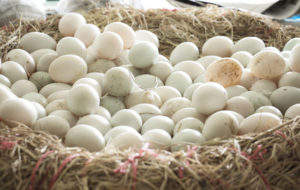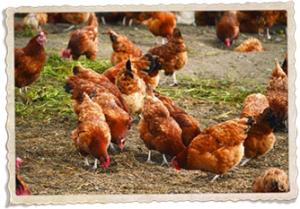When many people start a backyard flock, they typically start by raising chickens and producing chicken eggs. However, more and more people are discovering the joys and benefits of raising ducks as well. Ducks not only provide great companionship, but they will also produce plenty of delicious eggs.
These eggs are quite different from chicken eggs in taste, looks, and nutrition. Here, we tell you everything you need to know about duck eggs:
Duck Eggs Size and Looks
Generally speaking, duck eggs are larger than chicken eggs. In fact, they tend to be about 50% larger. Their size can vary by breed, but duck eggs can weigh anywhere from 1.55 ounces to 2.5 ounces.
They can also appear in a wide range of colors. Once again, this varies by breed. Some are blue, some white, and some pale green. You may even find some duck eggs that are gray.
What really makes duck eggs stand apart, though, are their tough shells. While chicken eggshells can be fragile, duck eggshells can withstand some beating. This can make them harder to crack, but it does ensure a longer shelf life.
Once you crack it open, you’ll find whites and yolks similar to chicken eggs. The whites are partially transparent, but the yolk will be larger than that of chicken yolk.
Duck Egg Nutritional Value
Because duck eggs are larger than chicken eggs, they will contain more calories. However, they’re also jam-packed with nutritional benefits. Here is a quick breakdown:
- Iron: 2.7 mg
- Protein: 9 g
- Vitamin A: 472 IU
- Choline: 184 mg
- Folate: 56 mcg
- Omega-3 Fatty Acids: 72 mg
Additionally, duck eggs contain a different kind of protein in their whites than chicken eggs. As such, people with chicken egg allergies can usually safely eat duck eggs, but be sure to check with your doctor first!
Egg Laying Duck Breeds
Just as certain chicken breeds are best for egg laying, there are certain duck breeds that are best for egg laying as well. Khaki Campbell ducks are the best breed for egg laying. They start laying when they’re 5-7 months of age and can product up to 300 eggs per year. They’re also avid foragers and extremely active.
Besides for the Khaki Campbell, there are several other duck egg laying breeds. These include the following:
- Runner
- Buff
- Magpie
- Welsh Harlequin
- Ancona
Caring for Duck Eggs
Once you have your collection of duck eggs, what do you do with them?
Duck eggs do not need to be refrigerated (neither do chicken eggs). However, they will last longer if you place them in the fridge. Duck eggs that are left out in the open will last about 3 weeks; duck eggs that are stored in the refrigerator will last 3-4 months.
You should also always wash your duck eggs, but when you wash them can vary. If you don’t want to store your duck eggs in the refrigerator, then wash the eggs just before you use them. Doing so will preserve the “bloom” or “cuticle”—an invisible coating over the eggshell that helps keep the egg fresh inside. When you wash an egg, you also wash away its coating. But if you plan to refrigerate your eggs, you can wash the eggs right as you get them.
If you’re looking to start raising ducks, Chickens for Backyards has many breeds for you to choose from. Look through our website or contact us today to get started!

